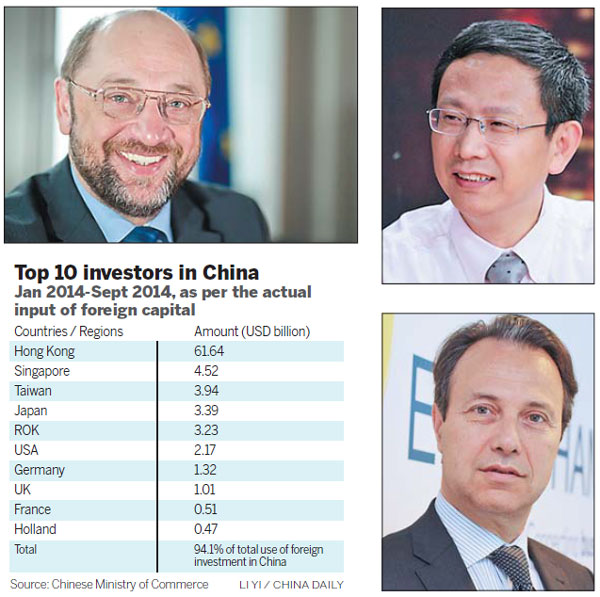Talks progressing 'quickly and smoothly'
Updated: 2015-03-20 07:34
By Liu Jia(China Daily Europe)
|
|||||||||||
Three days of talks in Beijing between China and the European Union that ended on March 19 are being seen as a turning point en the route to an investment treaty between the pair.
The talks, aimed at eliminating restrictions on investment, stimulating investment in both directions and improving market access, began during the 16th EU-China Summit in Brussels in November 2013.
The fourth round of talks in January ended with an exchange of written proposals.
|
Pascal Kerneis, executive director of the European Service Forum, which represents the EU's service sector. Photos provided to China Daily |

|
Clockwise from above: Chi Fulin, president of the China Institute for Reform and Development; Jia Kang, president of the Public-Private Partnership Research Committee in China; Arnaldo Abruzzini, secretary- general of Eurochambres and Martin Schulz, European Parliament president. |
|
Adam Dunnett, secretary-general of the European Union Chamber of Commerce in China. Provided to China Daily |
|
Chang Xiuze, executive deputy director of the Economic Research Institute of China's State Planning Commission. Provided to China Daily |
"Things have progressed relatively quickly and smoothly," one source close to the Chinese negotiating team says. "After four rounds there really is no conflict on the basic structure of the text."
European business groups dealing with the EU team are just as positive about the direction and pace of the talks, but "the most difficult stage still lies before the negotiators after resolving differences between the two parties in the first few rounds", experts say.
In the fifth round of talks in Beijing, negotiators are expected to review what had been agreed upon up to that point.
"That is to say, the Chinese will deliver their suggestions on the text after studying the EU proposal," says Pascal Kerneis, executive director of the European Service Forum, which represents the EU's service sector. He and members of the network were invited to a closed-door briefing hosted by the European Commission in Brussels on March 19.
Businesspeople have been invited to attend such meetings about every three months to be briefed on the negotiations, Kerneis says.
In Beijing, Adam Dunnett, secretary-general of the European Union Chamber of Commerce in China, says it has also been invited to attend such briefings.
European businesses at home and in China have eagerly been awaiting more progress on the agreement after the first four rounds.
The devil in the details includes delimiting market access by means of a negative list, resolving issues on protecting investors and implementing an investor-state disputes settlement mechanism.
A negative list sets out items, entities and products an agreement will not cover. That contrasts with a positive list setting out areas foreign investors are permitted to enter in a market that has been opened to them.
"There are severe restrictions in certain sensitive service industries in China such as financial, legal services, insurance, healthcare, telecommunications, etc," Kerneis says.
The barriers that potential foreign investors in China face include limits on equity participation and joint ventures being limited to certain sectors, he says.
In addition, transfers of technology and intellectual property rights may be required as a condition of equity participation, he says.
"A lack of mutual trust also discourages joint ventures to share know-how with any Chinese involved."
In addition, limits on the disbursement of profits can dampen foreign investors' enthusiasm, he says.
Arnaldo Abruzzini, secretary-general of Eurochambres, the Brussels-based chamber of commerce representing European businesses, says other hurdles European companies face include a lack of regulatory transparency and the unpredictability of the China's legal system.
Many European companies have complained that apart from difficulties in ensuring that any investment they undertake in China is done correctly, reliable information is hard to come by and there is no independent disputes settlement procedure.
As of the latest meeting in Beijing, both sides emphasized the importance of protection measures that are easy to implement and enforce, and an investor-state disputes settlement mechanism. With such a mechanism in place, investors could have a simple, secure and predictable legal framework for long-term investment.
At a seminar of the EU-China Reform Forum in Brussels last month, Chi Fulin, president of the China Institute for Reform and Development, says the Chinese market has plenty of scope for economic collaboration with Europe.
Chi says there is still a lot of scope for European businesses in services in China, and that the country's service-led economic transformation "will unleash potentially tremendous consumption worth as much as 50 trillion yuan ($8 trillion; 7.6 trillion euros) a year".
The Chinese proportion of the services sector in total GDP was expected to rise from 48.2 percent last year to 55-60 percent in 2020, Chi says.
European businesses in the service sector are keen to tap into the expanding market. Kerneis says European companies have huge possibilities, particularly as China faces severe challenges with sustainable urbanization and with the aging population.
As a reference point, Kerneis highlighted the challenges both the EU and Canada faced in their investment treaty talks.
It took the EU 18 months to prepare a negative list of more than 400 pages for the EU-Canada Comprehensive Trade and Economic Agreement. "The negotiations of which was completed last September," Kerneis says.
"China is such a huge, highly complex country, and it will take it a lot of time to deliver the negative list, too. That's why I say it is fast, considering that we started the talks at the end of 2013."
But, he adds, "we have to speed up".
Dunnett, the EU Chamber of Commerce in China representative, agrees that pace is critical.
But while businesses are keen on a speedy agreement, they do not want it at any cost.
"The speed of negotiations and the quality of the deal are both significant to us," Dunnett says.
"We really expect to see a breakthrough this year."
However, European Parliament President Martin Schulz, who was in China from March 15 to 17, says: "We certainly should not rush. A quality and added-value outcome is the priority".
Business representatives on the EU side say the main issues still to be settled are market access, transparency, non-discrimination and a level playing field for EU investors in China, none of which is a technical matter that can be resolved in an instant.
The EU has been China's top trading partner for a decade, and last year trade between the two accounted for nearly 15 percent of China's trade.
The impressive trade figure of 1 billion euros ($1.05 billion) a day, taking account both goods and services, towers over the figure for bilateral investment.
According to Eurostat statistics in 2013, EU total inward investment flows accounts for 327 billion euros, 14 billion euros lower than its total outward flows.
The Chinese Ministry of Commerce says the country's FDI outflows were worth almost $108 billion in 2013, 22.8 percent higher than the year before, making China the world's third-biggest foreign investor two years in a row.
But despite those impressive figures, foreign direct investment between China and the EU accounts for less than 10 percent of their respective global totals, China harvesting less than 3 percent of European FDI.
"Despite the growing importance of emerging economies as hosts to foreign-owned firms, the EU remains the largest investor and recipient of FDI," according to the European Commission in a report on FDI.
Francois Godement and Angela Stanzel, researchers at the European Council on Foreign Relations, argue that the EU's interest in clinching a bilateral investment treaty with China is two-pronged: gaining more market access for the EU and meeting China's demands for its investments to be better protected.
The euro crisis several years ago led to a desperate rush for liquidity and capital in Europe, Godement and Stanzel said in a research paper published in February. In particular, "as companies struggled to borrow at reasonable rates and new public debt was curtailed, the so-called periphery of the eurozone came under pressure" to seek more capital externally, including from China, they say.
Adam Dunnett says: "To have one deal with the EU replacing the existing 26 bilateral investment treaties signed with individual EU member states (except Ireland and Croatia) will save Chinese investors large amounts of time and energy."
A single, coherent deal will do away with the need for Chinese investing in the EU, the world's biggest market, to grapple with the differences in member states' protection policies, Dunnett says.
Chang Xiuze, executive deputy director of the Economic Research Institute of China's State Planning Commission, says the deal will force the China's industry to upgrade and give it further impetus to reform its economy.
External competition will help push forward structural reform and promote the country's competitiveness, Chang says.
"Having foreign companies vie with local ones will shatter protectionism, break state-owned monopolies and drive legal reform such as improving intellectual property rights protection and labor relations."
In such a climate, Chang says, subsidies to state-owned enterprises will gradually disappear.
"Foreign companies will come with advanced technology and innovation, and in addition to creating new jobs, market liberalization will greatly benefit Chinese consumers, who are thirsting for sophisticated services."
Jia Kang, a member of the National Committee of the Chinese People's Political Consultative Conference and president of the Public-Private Partnership Research Committee in China, says a bilateral investment treaty between China and the EU will improve the country's business environment.
"Chinese businesspeople will be able to learn from their counterparts elsewhere."
Dunnett says: "We believe that in a few decades when we look back, the success of the bilateral investment talks will be seen as a milestone for EU-China economic relations."
For China Daily
(China Daily European Weekly 03/20/2015 page6)
Today's Top News
Manhunt launched for accomplices in Tunisian museum attack
Chanel to reduce prices in China
Russian FM slams Kiev for turning Minsk agreements 'upside down'
European chamber calls on China to boost reforms
Chinese firm takes stake in French airport
Putin slams attempts to rewrite WWII history
EU police group launches team to tackle migrant smugglers
Britain needs oil tax cuts to attract North Sea investment
Hot Topics
Lunar probe , China growth forecasts, Emission rules get tougher, China seen through 'colored lens', International board,
Editor's Picks

|

|

|

|

|

|









